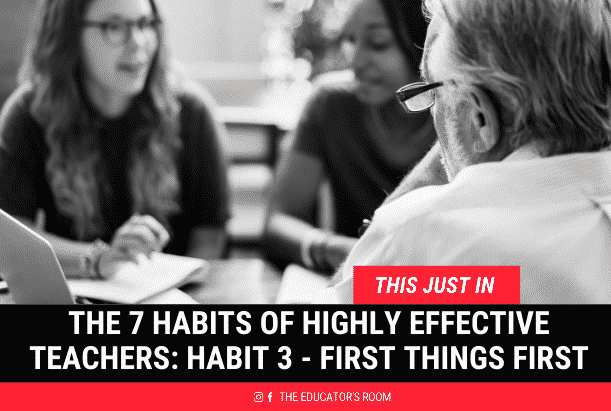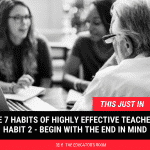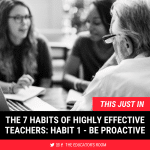My friend and former student-teacher called me the other week: “I need to vent to you for 10 minutes.”
“We were supposed to get the vaccine once our meetings finished today. I received a text at 12:50p telling me the window for the vaccine was 1p-4p. As I was heading out the door, I received an automated phone call at 1:30p saying they couldn’t take me today. Then at 3:30p they called again and said they could take me.”
“Wow…” was really all I could muster, “I’m so sorry!”
“But that’s not all! They said we’ll have to take off tomorrow for the vaccine. That means I have to change my lesson plan. It’s just not right for the kids, the teachers, or anyone to deal with this ineptitude.”
I paused for a moment and just let it sink in. She was outraged, and rightfully so. I would undoubtedly feel the same in this situation. But instead of agreeing with her, I felt I had an important point to make.
“First things first, Rach – get the vaccine.”
I shared how her lesson I’m sure will still be great. How my septuagenarian in-laws still have yet to get the vaccine here in Pennsylvania. How I’m not even on the calendar yet for my vaccine. I’d like to be in her position to do my part and get my vaccine. But, to do that, we all have to prioritize. We all have to put the first things first.
Last week we talked bout being proactive and beginning with the end in mind. This week, we move onto our next topic: First Things First, from Stephen Covey’s epic 7 Habits of Highly Effective People:
- Be Proactive (click here to read)
- Begin with the End in Mind (click here to read)
- First Things First
- Think Win-Win
- Seek to Understand, then Seek to Be Understood
- Synergy
- Sharpen the Saw
3rd Habit: First Things First
Part I. Prioritize the “Big Rocks”
The analogy driving this chapter of Covey’s book is something you may have seen or heard before. A teacher, addressing a class, grabs a jar, fills it with big rocks, and asks the class “is this jar full?” They say yes, and then she proceeds to add pebbles. Same question. Same answer. She repeats the process with sand. Then water (or beer or wine, depending on your storyteller).
The point of the parable is if we don’t put the big things in our jar first, we won’t have enough attention or time for them. That’s a powerful lesson.
I’ll never forget a conversation I had with a colleague with whom I taught both his children. When we brought home our second son from the hospital the year I taught his first, and I asked him how he did such a great job as a teacher and as a parent. His response was as simple as he is direct:
“My kids are my priority always. Nobody else is there to look out for, cheer, or support them like I will. And if they’re fine, these students are my priority and have my undivided attention here at school. But I don’t bring my students – or my work – home with me.”
And that’s when I stopped bringing my work home with me, or, in this year of Covid, at least commit myself to only working during the school day or when my children are sleeping.
Part II. Make Your Bed
William H. McRaven, retired Admiral of the U.S. Navy, shared a commencement speech in 2014 telling University of Texas Austin grads to make their bed. Seriously. It went viral not because he wanted nice, tight corners on bedspreads. Instead, the message resonated because he argued the day should be built victory upon victory. And that starts with a great first accomplishment, like:
- Making your bed
- Taking 10 minutes of reflection
- Cooking your kids a hearty breakfast
- Shopping for groceries when nobody is there
- Reading a worthwhile novel
- Writing 3 pages of your book
- Practicing yoga
- Seeing the sunrise on a walk
Look, I’m not trying to be critical here, but if your first accomplishment of the day is to pick up your phone and read all your friends’ social media posts you missed last night before going to bed, whose bed are you making?
Part III. Turn on Your REAL Notifications
I could find ceaseless amounts of articles telling you how to and the power of turning off your phone’s notifications, but instead, I’ll argue to turn on your real notifications. For example, are you attuned to these questions:
- Is your kid ready to use the potty for the first time or do they need deodorant?
- How can you better support their interests?
- Strengths?
- Buff their weaknesses?
- Are you looking forward to spending more time with your parents as it wanes with their age?
- Who do you miss having a connection with – and what can you do to re-establish it?
- Do you have a mentor?
- A mentee?
- How can you help your frustrated students?
- What can you do to learn about how your students tick?
- What did you do to bridge the gap with the diverse cultures of your classroom and school?
- Did you laugh today?
- What can you do to have fun?
- More of it?
- What’s a big dream you’ve always wanted to chase?
- What’s the biggest dream you’ve ever seen a kid pursue? How did you help them get one step closer?
- Are you on the pathway to financial soundness in retirement?
- How can you better connect with students?
- Through newer content?
- Technology?
- Do you know at least a few things about your colleagues?
- What do you need to do to learn more?
- Are you still greasing the wheel of your own education?
- How?
- What are you doing to “pay it forward?”
- Is there a task you really want to accomplish for a family member, a friend, or yourself?
- And more…
These are all questions that drive us. These should be our notifications.
Part IV. Work on What’s Important
Algebra teachers will enjoy this nugget: Stephen Covey argues that life’s moments are spent on Eisenhower’s Decision Matrix, with an x-axis of “urgency” and a y-axis of “importance.”
- Quadrant I is the “important and urgent” – the crises and issues that need fixing now, and the quadrant that needs our immediacy but living in but is chased with a side of Zoloft
- Quadrant II is the “important but not urgent” – the answers to the questions above
- Quadrant III is the “not important but urgent” – where email, meetings, and committees take our sanity to die
- Quadrant IV is the “not important and not urgent” – the places we waste time, by choice (social media) or not (force participation in something)
Stacey Abrams, political and business leader in Georgia, does an even better job of upgrading this matrix, outright stating “work-life balance… is a bald-faced lie.” She instead uses the term “Work-Life Jenga,” where she separates moving the planks of our life in three categories:
- Need to do – this is not the same as Quadrant I above, as Rep. Abrams says: “Untold amounts of lost time have been ceded to the urgent but not important, but you don’t have to play.” Stop playing on those silly committees at school and commit to valuing your time, even if (and especially when) others don’t.
- Oughta do – this is where we should live our lives, making changes inside and outside of the classroom. When your inbox is cleared, you get to think about your life’s mission. And, Abrams says, “if you can, delegate.” Teachers are borne from the belief that the collective movement raises all boats. Stop closing your door as something you oughta do, and, instead, start building movements.
- Might get around to – at the end of the day, it’s great (and healthy) to have a list of wants; the students in our class do. But the need-to’s and the want-to’s need a sharp line of division.
To close her wonderful Ted Talk (and later mentioned in her book Lead from the Outside), Abrams says:
“First things first” might be a cliché, but it’s a useful one that means prioritizing what matters most to you and believing there is no wrong answer.
[bctt tweet=”.@StaceyAbrams: “#Firstthingsfirst might be a cliché, but it’s a useful one that means prioritizing what matters most to you and believing there is no wrong answer.” #7habitseffectiveteachers #edupriorities @MrJakeMiller @EducatorsRoom” username=”@MrJakeMiller”]
Part V. Find Personal Development
Most states have regulations regarding how much professional development teachers must acquire at the beginning of their careers. Some set expectations to keep this up throughout their lifetimes.
But what are you doing to continue to be you?
The difficult part of our profession is we wear it everywhere we go.
- At the grocery store? A mom says, “Oh hi Mr. Miller!”
- Making a post on social media, writing an article, or running for office? “He can’t do that, he’s a teacher!”
- Heck, I even drove 500 miles to the beach only to lay my towel in the sand next to – you guessed it – two students, as they avoid me. “Ohhhh, there’s Mr. Miller.”
But while we may love our profession, we are not our profession.
Try any of these things on for size:
- Turn off your email at school while kids are there – answer the messages when they’re gone.
- Leave your phone in a drawer for 24 hours, or delete all the time-draining apps for a week
- Sketch out a schedule for the day and stick to it
- Or reflect on how you spent the day/week/month and if it mirrored your big rocks
- Turn on one new notification in “Oughta Do”
- Wake up early and just appreciate your partner/kids as they sleep (not in a creepy way, of course)
- Or just sit with yourself and your thoughts for 5 minutes
Whatever it takes to put First Things truly first. Today and all the tomorrows that follow.






